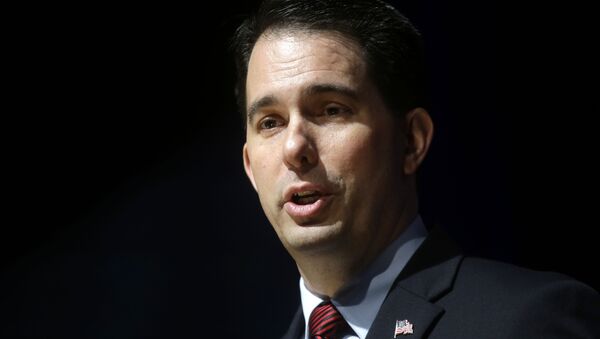Walker told a gathering of his fellow Republicans on Thursday that he firmly believes that "radical Islamic terrorists" are going to try to attack the US.
"It's not if another attempt is made on American soil, it is when," he insisted to the audience at the Southern Republican Leadership Conference, though he had no proof to offer them for his claims. He added that he'd "take the fight to them before they take the fight to us," and that fight could last quite a while.
Walker didn't go into details as to who exactly the greatest threats to the US were, or what type of military action he would prescribe, but this isn't the first time the governor has made similar statements embracing a policy of pre-emptive war.
At a New Hampshire GOP conference in April, Walker vied with other likely candidates to show off his willingness to use military force, asserting that the fight against radical Islamists won't be solved with "a couple of bombs," and using the same line about not waiting "till they bring the fight to us."
As a governor, he has no real foreign policy experience — he is not privy to the kinds of foreign intelligence reports that the president and many Congress members receive — and that is always a weak point for a presidential candidate.
Since a recent visit to Israel, Walker seems to be trying to take a strong stance to stand out in the field of potential GOP candidates. He cited conversations with Israeli officials to frame a criticism of President Obama as too meek in the face of threats to Israel.
"They feel every day like we felt after 9/11," he said, "and they feel like they don't have an ally in the United States, at least not in the president of the United States."
Many presidential hopefuls are being asked to weigh in on the question of whether George W. Bush was right to decide to invade Iraq.
Walker is positioning himself as hawkish in the face of terrorist threats but has said that he would not have made the same decision as Bush knowing — as we now do — that the weapons of mass destruction cited as a justification would never materialize.
— Donald J. Trump (@realDonaldTrump) May 13, 2015
Former Florida governor Jeb Bush - who has said he'd make the same decision in the same circumstance as he brother did — criticized Obama's withdrawal of troops but again, didn't offer a detailed alternative, merely saying he'd demur to military commanders.
— pourmecoffee (@pourmecoffee) May 13, 2015
Texas Governor Rick Perry — who would be taking a second shot at a presidential run — also insisted Obama "lost the peace" but only promised that he'd project sufficient "strength and resolve" to win it back.
Sen. Lindsey Graham of South Carolina and former Sen. Rick Santorum of Pennsylvania gave more specific, but also more aggressive assessments of what would be needed in the Middle East. Both have said that about 10,000 US troops and trainers would need to remain in Iraq, and Graham told CBS earlier this week that the US isn't likely to get completely out of the conflict any time soon.
"I'm afraid more American soldiers will die in Iraq and eventually in Syria to protect our homeland," he said.


